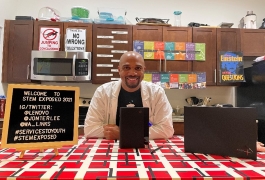Job Search 101
Last updated 8/2/22

As graduation approaches, the pressure is on to find a job. It’s reasonable to be nervous about demonstrating that you’re a good fit for a job even though you have little (possibly no) work experience.
Kara Allen KasaKaitas remembers this predicament very well. After graduating from Mississippi University for Women in 1996 with a degree in microbiology it took her a few months to land a job that used her degree-related skills. “The only positions I could find initially required experience,” she says. To make ends meet, she cooked chicken at a fast food restaurant for $5.50 an hour. “It was very humbling,” says KasaKaitas.
She soon moved on to a temp job doing microbiology at a food manufacturing facility, then transitioned to chemistry jobs. Now director of recruitment and university relations at Aegis Sciences in Nashville, TN, KasaKaitas remains sensitive to what she calls the “How can you get experience if no one will hire you situation."
So does Bela Torok, a professor of chemistry at the University of Massachusetts in Boston. He urges students to view their research experience while in college as work experience and to use their lab contacts as a fledgling network. “You get so many things in one,” he says.
Now both Torok and KasaKaitas volunteer as ACS Career Consultants, helping ACS members at all stages of their careers. These consultants are available for appointments, during which they help with job searches, advise about networking, review résumés, and conduct mock interviews. Here we compile some of their advice about getting started on your first job search.
Set goals, with an open mind
Start by thinking hard about your career goals (beyond just getting a job). Do some self-assessment: Think about the fields you are interested in (e.g., environmental work? consumer goods? policy?), what type of work you want, and why. Do you value stability and challenge (if so, you may like a job in an analytical lab)? Do you crave change and growth (if so, you may like working at a start-up)? What skills do you have, and which do you hope to develop?
Write down your thoughts and practice talking about them with friends and family. Articulating your goals is important when you’re interviewing for jobs or talking to people in your network who will help you with your job search. . You can use tools like ACS's ChemIDP to create an individual development plan that details your career goals steps you plan to take to achieve them.
You may be agonizing over looking for the perfect job versus finding any job. If you’re feeling desperate, you may be tempted to take anything, but don’t sell yourself short, Torok says. He advises applying for jobs that will help you grow professionally, even if they may not match your initial ideas. “Keep an open mind,” he says. “Maybe you loved organic chemistry as a student, but there are things beyond organic chemistry that might be interesting and rewarding, too.”
KasaKaitas agrees, noting that something that doesn’t look like your dream job may lead to something greater. She hired more than 500 people to test samples for SARS-CoV-2 virus last year. “I know that kind of job is not what new grad chemists would automatically look for,” she says, “but it gave them a chance to get in and get some experience in learning the lab workflows.”
Lean into your networks
Most people get jobs through professional contacts, especially in situations where hiring managers receive hundreds of applications for one position. Companies “often turn to someone they know and trust for recommendations,” Torok says.
Establish a LinkedIn profile, and then use it to connect with people you know and to reach out to people you don’t, like recruiters. And if you include details about your experience, recruiters may stumble across your profile and reach out to you. If there is a company you are interested in, go to their LinkedIn company page, reach out to the recruiters or hiring managers, and ask for advice about how to apply for jobs. If you do apply for one, let them know, and ask about the best way to track your application’s status.
Scientific meetings are also good places to network, either in person or virtually. These can be ACS national or regional events or other conferences hosted by societies that promote diversity in the sciences, including the Society for Advancement of Chicanos/Hispanics & Native Americans (SACNAS), National Organization for the Professional Advancement of Black Chemists and Chemical Engineers (NOBCChE), and American Indian Science and Engineering Society (AISES).
Don’t forget to attend your local ACS section events. Members of local sections will have information about jobs in the area. Also take advantage of ACS meetings and the ACS student chapter on your campus. Chemists from all fields working in various job sectors attend ACS meetings, and plenty of career resources and networking opportunities are available to students.
ACS also offers the Career Consultant program and other career resources to help members develop a career plan. After filling out an online application, members are paired with an ACS Career Consultant for a free consultation.
You can also get guidance from your institution’s career counseling office. Each field has its own expectations, however, so meet with someone who understands the chemistry field.
Search online
There are many online job boards (e.g., C&ENjobs), but KasaKaitas recommends choosing a job search engine like Indeed, Glassdoor, or LinkedIn to aggregate ads from them.
Target your job search. If you only have a bachelor’s degree, don’t apply for a job requiring a PhD. When people apply for any job regardless of their qualifications, the accumulated rejections will take a toll. “If students focus on the right jobs for them, the success rates will be much higher,” Torok says.
Yet, don’t be shy about using a position you are unqualified for to kick off a networking conversation, KasaKaitas says. For example, note that you saw the ad for a PhD-level job and ask what someone with your degree could look for at that company.
If a company is one you haven’t heard of, look it up online to learn more and to confirm it is legitimate. But save deep research for after you land an interview.
Hiring managers will search your digital footprint, so “don’t put up drunken party pictures to your Instagram,” Torok says. Make sure your internet presence does not put you in a negative light.
Ready résumés and references
Update your résumé and make it detailed. Instead of simply noting your chemistry degree, add specific information about your experience, skills, and outreach activities.
Tailor each résumé to the specific job. If you are applying for a teaching job, highlight your outreach experience; if it’s an industry job, emphasize the procedures you are familiar with.
Fill out the applications carefully, with attention to capitalization and punctuation; never enter “see résumé" as an answer. “The application represents how people present themselves. Sometimes people don’t want to take the time to fill it out, which says a lot,” KasaKaitas says.
Line up your references, and keep them apprised of your applications so that they can speak knowledgeably about why you’d be a good fit for a particular job. Some hiring teams will want references with the initial application, whereas others wait until later in the process.
Right now we’re in the middle of a pandemic, and the job market is unpredictable. The best thing you can do is hold onto a positive mindset. You don’t have to worry about being an expert, just be ready to state what you have done, Torok says.



